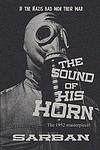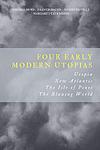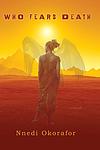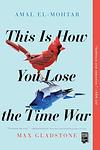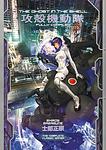The Greatest Non-Western "Science fiction" Books of All Time
Click to learn how this list is calculated.
This list showcases a comprehensive and trusted collection of the greatest books from Non-Western literature. Curated through a specialized algorithm, it amalgamates 300 'best of' book lists to present a definitive guide to essential literary works from Asia, Africa, the Middle East, Latin America, and beyond. This selection celebrates the diverse and vibrant literary traditions of the world, offering readers a window into a myriad of fascinating narratives and perspectives. For more information on how these books are selected, please visit the rankings page.
Genres
Science fiction is a genre of literature that explores the potential consequences of scientific and other innovations on society and individuals. It often features futuristic or imaginary settings, advanced technologies, and scientific concepts that are not yet fully understood or realized. Science fiction can encompass a wide range of themes, including space exploration, time travel, artificial intelligence, and alternate realities. It is a genre that allows authors to speculate on the future of humanity and the impact of scientific progress on our lives.
Date Range
Reading Statistics
Click the button below to see how many of these books you've read!
Download
If you're interested in downloading this list as a CSV file for use in a spreadsheet application, you can easily do so by clicking the button below. Please note that to ensure a manageable file size and faster download, the CSV will include details for only the first 500 books.
Download-
1. Never Let Me Go by Kazuo Ishiguro
The novel is a haunting tale of three friends, who grow up together at a seemingly idyllic English boarding school. As they mature, they discover a dark secret about their school and the purpose of their existence, which is to become organ donors for the rest of society. The story is a profound exploration of what it means to be human, the morality of scientific innovation, and the heartbreaking reality of love and loss.
-
2. Solaris by Stanislaw Lem
The novel is a psychological exploration of human limitations and failures set against the backdrop of space exploration. When a psychologist arrives at a research station orbiting a distant planet covered entirely by a sentient ocean, he discovers the crew in disarray, haunted by physical manifestations of their subconscious fears and desires. As he grapples with the ocean's inscrutable nature and its unsettling ability to materialize human thoughts, he is forced to confront his own guilt and regret, embodied by the apparition of his deceased wife. The story is a philosophical meditation on the impossibility of truly understanding alien intelligence and the painful isolation of the human condition.
-
3. The Sound Of His Horn by Sarban
"The Sound of His Horn" is a dystopian science fiction novel set in a future where the Nazis have won World War II. The story follows Alan Querdilion, a British prisoner of war who wakes up in a bizarre alternate reality ruled by a cruel and sadistic Nazi regime. As he navigates this nightmarish world, Querdilion must confront his own survival instincts and grapple with the moral implications of his actions. With its haunting atmosphere and thought-provoking exploration of power and humanity, the novel offers a chilling and unsettling reflection on the consequences of totalitarianism.
-
4. The Three-Body Problem by Cixin Liu
The book is a science fiction novel that intertwines the cultural revolution of China with a complex narrative involving astrophysics, virtual reality, and alien contact. It follows a disillusioned scientist who, after suffering personal tragedy during the Cultural Revolution, sends a message into space, only to receive a response from an alien civilization on the brink of destruction. As the aliens plan their migration to Earth, a secret organization works to facilitate the invasion, while a disparate group of scientists and military personnel attempt to understand and prevent the impending extraterrestrial crisis. The novel grapples with themes of human nature, technological advancement, and the vast, often incomprehensible universe.
-
5. The Futurological Congress by Stanislaw Lem
In a dystopian future, the protagonist attends a scientific conference where he is exposed to a new hallucinogenic drug that transports him to a surreal and chaotic world. As he navigates through this bizarre reality, he becomes entangled in a conspiracy involving mind-altering technology, political manipulation, and the struggle for power. This satirical novel explores themes of reality, identity, and the dangers of unchecked technological advancements.
-
6. Akira by Katsuhiro Otomo
Set in a post-apocalyptic Neo-Tokyo, this graphic novel follows the lives of two teenage friends, Tetsuo and Kaneda, who are members of a biker gang. After a motorcycle accident, Tetsuo develops telekinetic abilities and is taken by the military, which fears his growing powers might unleash another cataclysmic event similar to the one that destroyed Tokyo years earlier. As Tetsuo's powers spiral out of control, Kaneda, along with a group of rebels and psychics, must try to stop him and uncover the secrets of a mysterious entity known as "Akira," which is at the heart of the government's experiments and the city's destruction. The narrative explores themes of power, corruption, and the quest for identity against a backdrop of cyberpunk visuals and intense action.
-
7. The Blazing World A New World by Margaret Cavendish
"The Blazing World" is a pioneering work of science fiction and feminist literature that tells the story of a young woman who is kidnapped by a merchant and taken on a voyage to the North Pole, where she enters a parallel universe. In this other world, she becomes the empress of a society inhabited by a variety of hybrid creatures. The empress engages in philosophical discussions with the inhabitants and uses her power to lead a grand intellectual and military campaign back in her own world. The narrative explores themes of power, gender, and the role of science and knowledge, as the protagonist asserts her authority in a world that reflects the author's imaginative and intellectual ambitions.
-
8. The Aleph And Other Stories by Jorge Luis Borges
This collection of short stories delves into a world of philosophical puzzles, literary references, and metaphysical intrigue. The narratives, often presented as intellectual exercises, explore themes of infinity, reality, and the nature of language and thought. The centerpiece story features a point in space that contains all other points, providing the protagonist with a vision of the entire universe. The other tales similarly challenge the reader's perception of time and identity, weaving together myth, religion, and history into a complex tapestry that defies conventional storytelling and blurs the line between the real and the imagined.
-
9. The Sheep Look Up by John Brunner
"The Sheep Look Up" is a dystopian science fiction novel that presents a grim and polluted future where environmental degradation and overpopulation have reached catastrophic levels. The story follows various characters as they navigate a world plagued by toxic pollution, food shortages, and rampant disease outbreaks. With a sharp critique of corporate greed and government negligence, the novel explores the consequences of humanity's disregard for the environment and the urgent need for change.
-
10. Cat Country by Lao She
This novel is a satirical science fiction tale that transports the reader to Mars, where the protagonist, a Chinese man, finds himself stranded in a society inhabited by cat-like humanoids. The narrative delves into the peculiarities and dysfunctions of this Martian civilization, known as Cat Country, highlighting its inhabitants' indolence, corruption, and societal decay. Through the lens of this alien society, the author critiques various aspects of early 20th-century Chinese society, politics, and culture, using the allegorical Cat Country to reflect on human follies, the dangers of political apathy, and the consequences of societal neglect. The story is both a unique exploration of extraterrestrial life and a poignant commentary on the human condition.
-
11. The Invention Of Morel by Adolfo Bioy Casares
This novel unfolds on a mysterious, deserted island where the protagonist, a fugitive, discovers a strange building and a group of tourists who appear and disappear inexplicably. As he observes them, he falls in love with a woman among the group, but soon realizes that these visitors are not what they seem. The narrative takes a turn into the surreal when he uncovers the workings of a machine invented by a man named Morel, which has the power to record and replay reality. The protagonist grapples with the implications of this invention on his perceptions of love, existence, and the desire for immortality, leading to a haunting exploration of the boundaries between reality and illusion.
-
12. Sultana's Dream by Rokeya Sakhawat Hossain
"Sultana's Dream" is a pioneering feminist utopian story that imagines a world where women, having mastered science and technology, have reversed traditional gender roles to create a peaceful society called Ladyland. In this visionary tale, men are secluded in domestic spaces, while women run the government, excel in scientific innovation, and use solar power and other advanced technologies to maintain an environmentally sustainable and conflict-free environment. The narrative unfolds through the eyes of the protagonist, Sultana, who finds herself transported to this alternate reality in a dream, where she engages in conversations with Ladyland's inhabitants, exploring the social structures and scientific advancements that have enabled women to thrive and lead.
-
13. Who Fears Death by Nnedi Okorafor
This novel is a coming-of-age narrative set in a post-apocalyptic Africa. It follows the journey of a young woman born from a violent act, who is prophesied to bring an end to a brutal regime. As she grows, she discovers her magical abilities and must learn to control them in order to fulfill her destiny. The narrative explores themes of race, gender, and power, while incorporating elements of African mythology and culture.
-
14. The Ice People by Unknown
The book in question is a speculative fiction novel set in a dystopian future where a sudden and severe ice age has gripped the Earth, leading to the collapse of civilization and the emergence of a new society. The story follows the protagonist, a historian, who discovers the truth about the ice age's origins and the existence of an advanced prehistoric civilization. As the protagonist delves deeper into the past, he uncovers startling revelations about humanity's history and the cyclical nature of human progress and decline, all while navigating the challenges of life in a frozen world.
-
15. Feed by Seanan McGuire
In a world where humanity has been ravaged by a zombie apocalypse, a team of bloggers sets out to cover the presidential elections, offering a unique perspective on the state of a society where the undead are a constant threat. The protagonist, a young woman with a passion for the truth, navigates a landscape of danger, political intrigue, and conspiracy, all while dealing with the challenges of living in a post-apocalyptic environment. As they delve deeper into the heart of America's reanimated politics, they uncover a plot that could have dire consequences for both the living and the undead, forcing them to confront the question of what it truly means to be human in a world overrun by zombies.
-
16. The Cyberiad by Stanislaw Lem
"The Cyberiad" is a collection of science fiction short stories that take place in a futuristic universe where robots and artificial intelligence are prevalent. The book follows the adventures of two master inventors, Trurl and Klapaucius, as they encounter various challenges and engage in extraordinary feats of engineering and problem-solving. Through witty and imaginative storytelling, the book explores themes of technology, creativity, and the nature of humanity, offering a captivating and thought-provoking reading experience.
-
17. Binti by Nnedi Okorafor
"Binti" is a science fiction novella that follows the journey of a young Himba girl named Binti, who defies her family's wishes and leaves her home to attend the prestigious Oomza University. As the first of her people to be accepted, Binti faces various challenges and cultural clashes as she navigates the complexities of interstellar travel and encounters an alien race known as the Meduse. Through her unique abilities and determination, Binti becomes a bridge between two civilizations, ultimately transforming her own identity and challenging societal norms.
-
18. Death's End by Cixin Liu
In this science fiction epic, humanity confronts an uncertain future as the universe teeters on the brink of destruction. The narrative weaves through time and space, following a complex tapestry of characters and civilizations as they grapple with advanced alien technologies, cosmic dilemmas, and philosophical quandaries. The story explores the depths of human ingenuity and the vastness of the cosmos, culminating in a profound examination of survival, sacrifice, and the indomitable spirit of life in the face of an unfathomable cosmos. With a blend of hard science fiction and imaginative speculation, the novel pushes the boundaries of human understanding and presents a grand vision of the ultimate fate of the universe.
-
19. The Dark Forest by Cixin Liu
In the second installment of a renowned science fiction trilogy, humanity is faced with an impending alien invasion, set to occur in four centuries. The world turns to the Wallfacer Project, a strategic initiative that appoints four individuals with the power to execute plans to combat the extraterrestrial threat, their strategies hidden even from humanity to prevent the aliens from gaining foreknowledge. One of these Wallfacers, a disillusioned astronomer, devises a complex plan involving astrophysics, sociology, and game theory, all while grappling with the philosophical implications of a universe where survival is predicated on a dark forest theory, where civilizations are hunters lying in wait, ready to strike out of fear and self-preservation.
-
20. Gideon The Ninth by Tamsyn Muir
In a universe where necromancers hold power, Gideon, a skilled swordswoman, is reluctantly paired with her childhood rival, Harrow, to compete in a deadly trial that could grant them immortality. As they venture into an ancient, decaying mansion filled with secrets and puzzles, they must unravel the mysteries of their world and face sinister forces lurking within. With a blend of dark humor, complex characters, and a gripping plot, "Gideon The Ninth" is a thrilling and unique blend of science fiction and fantasy.
-
21. The Difference Engine by William Gibson, Bruce Sterling
"The Difference Engine" is an alternative history novel set in Victorian England, where Charles Babbage successfully builds his Analytical Engine, a revolutionary steam-powered computer. The story follows two protagonists, one a paleontologist and the other a detective, as they become embroiled in a conspiracy involving political intrigue, technological advancements, and a dangerous secret society. With a blend of historical accuracy and speculative fiction, the book explores themes of power, progress, and the consequences of technological innovation.
-
22. This Is How You Lose The Time War by Amal El Mohtar, Max Gladstone
In this epistolary science fiction novel, two rival agents, Red and Blue, find themselves on opposite sides of a sprawling temporal conflict known as the Time War. As they carry out missions to manipulate the strands of history for their respective factions, their paths cross in unexpected ways. Through a series of secret letters left across time and space, what begins as taunting correspondence evolves into a deep, forbidden connection. The narrative weaves a complex tapestry of time-travel and intrigue, exploring themes of love, identity, and the consequences of actions within the ever-shifting sands of time. As their bond deepens, Red and Blue must ultimately decide where their loyalties lie and what sacrifices they are willing to make for a chance at a future together.
-
23. The Black Tides Of Heaven by Neon Yang
In a fantastical Asian-inspired world where the forces of magic and technology intertwine, two twins are born to the Protector, a tyrannical ruler with a powerful grip over the realm. The twins, Mokoya and Akeha, are gifted with prophetic and magical abilities, respectively, and are sent to a monastery to hone their skills. As they grow older, they find themselves at the heart of a rebellion against their mother's oppressive regime. The story explores themes of destiny, freedom, and the complex bonds of family, all while the twins grapple with their identities and the paths they choose to take in a society where gender is fluid and self-determined.
-
24. The Old Drift by Namwali Serpell
"The Old Drift" by Namwali Serpell is a sweeping and ambitious novel that spans generations and continents, exploring the intertwined lives of three families in Zambia. Set against the backdrop of colonialism, technological advancements, and political upheaval, the story delves into themes of love, power, and identity. From the early days of the British settlers to the rise of an experimental town and the emergence of a new generation, Serpell weaves a rich tapestry of characters and narratives, offering a thought-provoking exploration of history, race, and the impact of human actions on the world.
-
25. The Ghost In The Shell by Shirow Masamune
This science fiction narrative delves into a future where cybernetic enhancements and artificial intelligence have blurred the lines between humanity and machines. Set against a backdrop of political intrigue and cyber warfare, the story follows Major Motoko Kusanagi, a cyborg operative of a government agency, as she hunts a mysterious hacker known as the Puppet Master. Through her pursuit, the narrative explores themes of identity, consciousness, and the nature of the soul, questioning what it truly means to be human in a world where the physical and digital realms are indistinguishably intertwined.
Reading Statistics
Click the button below to see how many of these books you've read!
Download
If you're interested in downloading this list as a CSV file for use in a spreadsheet application, you can easily do so by clicking the button below. Please note that to ensure a manageable file size and faster download, the CSV will include details for only the first 500 books.
Download

